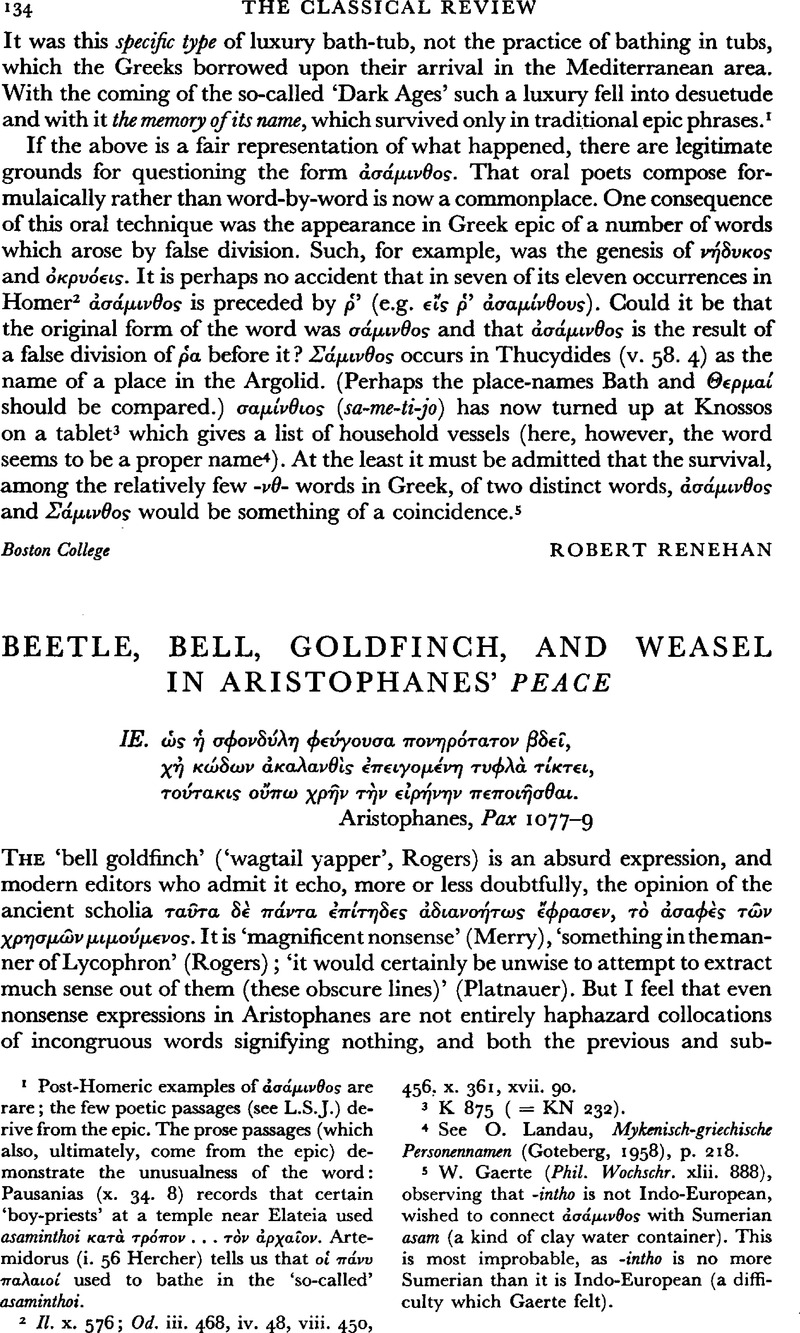Published online by Cambridge University Press: 27 February 2009

page 134 note 1 Post-Homeric examples of ⋯σ⋯μινθος are rare; the few poetic passages (see L.S.J.) derive from the epic. The prose passages (which also, ultimately, come from the epic) demonstrate the unusualness of the word: Pausanias (x. 34. 8) records that certain ‘boy-priests’ at a temple near Elateia used asaminthoi κατ⋯ τρ⋯πον …τ⋯ν ⋯ρχαῖον.. Arte-midorus (i. 56 Hercher) tells us that οἱ π⋯νυ παλαιο⋯ used to bathe in the ‘so-called’ asaminthoi.
page 134 note 2 Il. x. 576; Od. iii. 468, iv. 48, viii. 450, 456. x. 361, xvii. 90.
page 134 note 3 K 875 (= KN 232).
page 134 note 4 See Landau, O., Mykenisch-griechische Personennamen (Goteberg, 1958), p. 218.Google Scholar
page 134 note 5 W. Gaerte (Phil. Wochschr. xlii. 888), observing that -intho is not Indo-European, wished to connect ⋯σ⋯μινθος with Sumerian asam (a kind of clay water container). This is most improbable, as -intho is no more Sumerian than it is Indo-European (a difficulty which Gaerte felt).
page 135 note 1 Crusius, ‘Ueber die Sprichwörtersammlung des Maximus Planudes’, Rh. M. 42 (1887), 404. Cf. also Macar. 5. 32, Apost. 10. 23, Aes. 251 Hausrath, Gal. iv, p. 639K., Max. Conf. Serm. 19, p. 593.
page 135 note 2 Cf. Hsch., Et. M. s.v. Άκαλανθ⋯ς.
page 135 note 3 So too the many proverbial expressions such as qui nimis propere, minus prospere, more harry, less speed, or the conclusion of the Aesop fable of ὔς κ⋯ων (251H.), οὐκ ⋯ν τ⋯ τ⋯χει τ⋯ πρ⋯γματα, ⋯ν τῇ τελει⋯τητι κρ⋯νεται. But Herodotus' use of both ⋯πε⋯γω and τ⋯κτω here suggests a specific allusion to the dog proverb.
page 135 note 4 Schol. Townl. Il. xix. 119 (quoting Istros) γαλ⋯ς δ⋯ παρελθο⋯σης ⋯ναλ⋯σαι (sc. ὠδῖνας Ἀλκμ⋯νης) κα⋯ τεχθ⋯ντος αὐτο⋯ νομισỆναι Γαλ⋯ν εἶναι αὐτῷ τρ⋯φον. Aelian (N.A. xii. 5) is inclined to scepticism.
page 135 note 5 That is, the part played by the weasel, or attendant, first in Istros (see previous note). The myth of the delayed birth and the parts played by Hera, the Eilithyiai, are of course as old as Hom. Il. xix. 96 ff.
page 136 note 1 Otherwise, Akalanthis occurs as a proper name (of a courtesan) in Alciphr. Ep. iii. 64.
page 136 note 2 Cf. Sykes, A., C.R. xxxii (1918), 110–111.Google Scholar
page 136 note 3 In Artem. 3. 28 (p. 180H.) the weasel is called ἱλαρ⋯α (a pet name, L.S.J.), which may have similar associations, although suspect some sort of pun on γαλ⋯—γαλην⋯ς (Hsch. γαλην⋯ς—ἱλαρ⋯ν). Hehn, Kulturpflanzen und Hausthiere 6, p. 588, gives other examples of these weasel names. The Spanish comadreja literally means ‘midwife’, which is curious in view of the legend of Heracles' birth, but this is presumably a coincidence, as the word is used also of a housewife or ‘gossip’. In the dialect of Somerset and Devon the weasel is called vairy (fairy), but although this is frequently cited in etymological dictionaries (e.g. Bloch-Wartburg, Dictionnaire étymologique de la langue française 4 [1964]) as belonging to the same class of word as belette, etc., Mr. M. F. Wakelin of the Leeds University Institute of Dialect and Folk Life Studies informs me that this is erroneous (although of course folk etymology may suppose it to be right), since the word derives from O.Fr. vair, Lat. varius, etc.
page 136 note 4 Cf. Chaucer, Canterbury Tales 3233–4, Fair was this yonge wyf, and ther-with-al-As any wesele hir body gent and smal.
page 136 note 5 See however Gow's note in C.Q. xvii (1967), 195–7.
page 136 note 6 I notice that the modern Italian version of the proverb substitutes cats for dogs—La gatta frettolosa fece i gattini ciechi (A. Arthaber, Dizionario comparato di proverbi).
page 137 note 1 Aes. 50 (Hausrath), Babr. 32, the proverbial γαλῇ χιτώνιον (Zenob. 2. 93), etc. Cf. Zeus, fox and beetle (Aes. 109), and the story of the apes in Luc. Pisc. 36. The remark made to Vespasian (Suet. Vesp. 16) uulpem pilum mutare non mores appears in a Greek equivalent (Apost. 12. 66) with the wolf instead of the fox.
page 137 note 2 On which see B. E. Perry, Aesopica i, pref. xi and Fab. Lat. 613, p. 636; Stith-Thompson, Motif-Index of Folk-Literature, J. 671. 1.
page 137 note 3 Cf. Frazer on Paus. ix. 11. 3. For bell-ringing on the birth of a child, see Stith-Thompson, op. cit. T. 583. 3.
page 137 note 4 A recent attempt to explain it has been made by K. J. McKay in a review of Platnauer's edition, A.U.M.L.A. xxiii (May 1965), p. 123, who refers to a ‘humorous kenning modelled on oracular obscurity’, and thinks that κώδων might (with reference to the dog proverb) suggest χαλκε⋯φωνος Cerberus.
page 137 note 5 See Florence McCulloch, Mediaeval Latin and French Bestiaries, 186–8.
page 138 note 1 Arist. H.A. 542a10 (v. 1. οπονδ⋯λη Thphr. H.P. ix. 14. 3, Ael. N.A. viii. 13.
page 138 note 2 Sharpley, in his little-known edition of the Peace, suspects Hesychius of having conjectured this meaning of σπονδ⋯λη)in Attic simply to suit this passage, but this seems ultra-sceptical.
page 138 note 3 For ⋯νοικ⋯διοι, κατοικ⋯διοι weasels, cf. Dsc. ii. 25, Philum. Ven. xxxiii. 1, Aret. C.D. i. 4.
page 139 note 1 Latomus xii (1953), 137–54.
page 139 note 2 Renard compares the well-known stanza of Catullus' Diana hymn (34. 13–16) where the goddess is successively identified with Lucina, Iuno, Trivia, Luna.